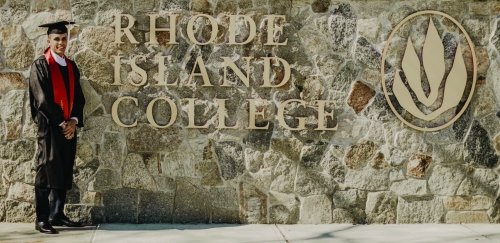Class of 2021: Computer Science Grad (Re-)Learns in a New Language
- News & Events
- News
- Class of 2021: Computer Science Grad (Re-)Learns in a New Language

Oliver Feliz-Lima refused to let a language barrier become an obstacle to his education.
On May 15 Oliver Feliz-Lima graduated with a bachelor’s degree in computer science and a minor in mathematics. He came from the Dominican Republic to the United States six years ago with two years of college studies of electromechanical engineering, but with little information on what to do to continue his career in this country.
It was a challenge for him to gain acceptance at many colleges because of his level of English. “Before coming here, I had good notions of the language, but when I faced reality I realized that I didn’t know much,” he says. “It was not what I expected.”
Oliver didn’t let the language barrier become an obstacle to education. During the next year and a half, he found a job, started taking classes in the ESL Intensive program at RIC and, most importantly, learned how to transfer class credits from his country to higher education institutions in the U.S. “The school evaluates your credits and tells you what works or not, depending on your career choice,” he explains. “Mine had a lot to do with mathematics and technology, so it was very easy to enroll in computer science.” In the end, RIC validated around 60 credits.
After completing level five of the English program in 2017, he was able to matriculate at RIC in the computer science program. He was eligible for a financial aid package that would cover 60 percent of his tuition if he maintained a high grade point average. He managed a 3.895 GPA and covered the remaining 40 percent of his tuition through loans. He went on to graduate summa cum laude and also received a certification from the Upsilon Pi Epsilon Honor Society for the Computing and Information Disciplines
“I started to get used to life here and the ways to move around,” he says. “I always had a clear vision of what I wanted to do. After I got used to this country, everything was easier. I have always been a person who adapts easily.”
For Oliver, technology was not just a career path; it is his passion. The desire to achieve more than just a paycheck is what motivated him to move to the US in the first place. “Human beings can give much more than just being valued for a few dollars,” he says. “It is extremely difficult to live in another country. For a person to make the decision to leave their country with all their knowledge and be satisfied with less – I would say that is not worth it to move at all.”
That determination motivated Oliver to work even harder. He had to relearn in English what he already knew in Spanish, for example. Although he had a very good level of knowledge about mathematics, he saw the need to enroll in less advanced classes. “I needed to understand the symbols and the way of saying what I knew, but in English,” he explains. “The language barrier is high. If a person does not learn the basics, they will have a hard time here. But a person who perseveres and believes in themselves can cross any barrier without hesitation. I think I am going at a good pace so far,” he adds.
After graduation, Oliver hopes to find a job and continue his postgraduate studies in cybersecurity or software development. He’s trying to line up interviews, and has already gotten a couple of bites.
For now, Oliver is satisfied just to have overcome the obstacles necessary to join the ranks of RIC alumni. “I had this complex wondering if any college was going to accept me,” he says. “Rhode Island College did. I am proud to have graduated from a college that gave me the opportunity to become a professional.”
